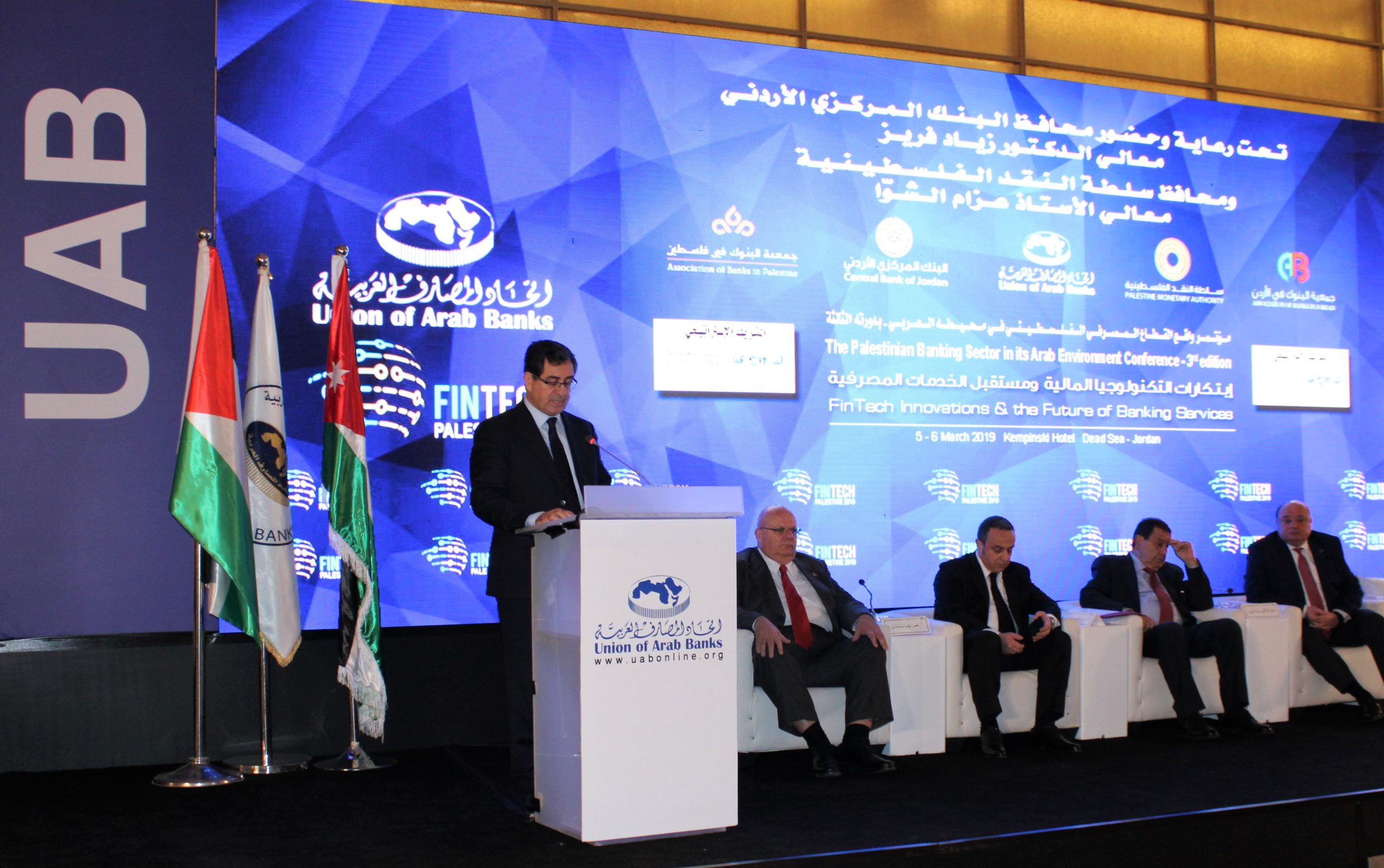
Dead Sea, 6 March (Petra)- Union of Arab Banks (UAB), in cooperation with CBJ, Palestinian Monetary Authority (PMA), ABJ and Association of Banks in Palestine (ABP), organized the third session of The Palestinian Banking Sector in its Arab Environment Conference, under the theme of Fin Tech Innovations and the Future of Banking Services.
Participants, banking experts from different Arab countries, discussed the role of central banks in backing the digital transformation and facing new regulatory and supervisory challenges; developments in financial technology and expected consequences on financial stability and systematic risks; digital technology and development of financial services; the effect of tech start-ups on the future fin tech and conventional institutions; and, the role of fin tech as a new instrument in enhancing financial inclusion and supporting SMEs.
CBJ Governor, Dr. Ziyad Fareez, under whose patronage the conference was convened, said there is a point of change at the regional and world levels; namely, the intent to advance the quality of financial services and banking based on fin tech innovations, by providing digital financial and banking services that lead to change into an innovation and knowledge based economy.
Fareez said fin tech plays a prominent role in transforming the scene of financial and banking services. It helped adopting new business models and the ushering of faster non- financial companies into the field to provide services relevant to banking and financial domains, including retail and wholesale payments, customer relations, credit granting, in addition to financial markets’ infrastructure, etc.
Central banks and monetary authorities supervising the banking sector, he added, believes in the importance of fin tech and its effect on the future of financial and banking services. Using modern fin tech in Arab countries, he went on to say, is still weak because of many obstacles, the most important of which is the weak business environment, the lack of the proper legal framework, the limited institutional support to providing incubators or regulatory labs that permit fin tech companies and conventional banking and financial institutions to test innovations in actual environments, and the low levels of financial education, financial awareness and the distrust that are all constraints against adopting this technology.
Arab regulatory authorities should step in, particularly central banks and monetary authorities, he stressed. They should make the necessary changes at the level of legal frames and the proper regulatory practices that support electronic transactions and address risks relevant to modern financial technologies in a way that helps to create a banking environment prepared to adopt fin tech in providing services and business, instead of the conventional ways. There should be also focus, he added, on spreading financial culture and increasing awareness of their usage, and seeking to develop incubators and accelerators of fin tech.
In this regard, he pointed to the joint efforts of the CBJ and PMA to have continuous coordination and contact in developing and adopting fin tech and its innovations, exchanging knowledge and expertise in this field, and the common research to enhance the e-payment system and financial inclusion.
ABJ Board Chairman Hani Al Qadhi said Palestinian economy is banks-based economy. Assets of banks working in Palestine constitute 109% of Palestinian GDP, deposits account for 83% of GDP, while credit facilities constitute 55%, the matter that reflects the depth and importance of Palestinian banking sector to Palestinian economy.
In a speech that ABJ General Director Adli Kandah delivered on his behalf, Al Qadhi said the number of banks working in Palestine was 14 banks in 2018, 7 of them are Palestinian and 7 non-Palestinian, of the non– Palestinian there are 6 Jordanian banks, namely, the Arab Bank, Cairo Amman Bank, Bank of Jordan, Housing Bank for Trade and Finance, Jordan Ahli Bank, and Jordan Commercial Bank. The number of branches and offices reached 351 branches and offices by the end of 2018.
Palestinian banking sector registered noticeable growth rates at all levels during the last ten years, he said. Total assets of banks operating in Palestine grew by an annual average of 7.8% to reach $16.1 billion by the end of 2018. Total credit facilities grew by 16.8% to reach $8.44 billion. Total deposits grew by 8.3%, reaching $12.23 billion, and capital grew by 8.5% annually to reach $1.91 billion.
As regards financial strength indicators, he said that capital adequacy rate of banks working in Palestine reached 16.6% at the end of 2017, higher than the requirements of Basel Committee, which is 8%, and higher than the requirements of PMA, which is 12%. The percentage of bad credits to total credits is 2.3%, while the coverage percentage of non-performing debts reached 58.4%.
At the level of profitability indicators, banks working in Palestine registered an ROA of 1.5% and ROE of 16.1% at the end of 2017.
Al Qadhi said that fin tech was able to penetrate the basic banking services, such as the credit and deposit services; payments, clearing and settlement; investment management, in addition to its ability to penetrate the market support services which are not directly relevant to the financial sector but affect it greatly, such as the services of electronic gates, data collectors, data applications, block chain, cloud accounting and artificial intelligence.
As regards the future of banking services in light of fin tech innovations, a number of reports point out that despite the relative decline in the volume and number of investments in the fin tech products and services compared with the volume of the world financial sector as a whole, the upward progress and the accelerating growth of fin tech indicate that it will seize a great percentage of financial industry shortly. Therefore, banks and supervisory authorities should continue to focus and follow up this issue.
UAB Secretary General Wissam Fattouh said the conference focuses on one of the most important issues facing the financial and banking community, both in terms of the opportunities it offers and the risks it represents, namely, “dependence on the different applications of technology in banking industry.”
“The world is witnessing an accelerated transition from cash to no cash economy, thanks to financial technology and the tools it provides to reduce dependence on paper money , and move to reliance on encrypted electronic money,” he added.
Banks, he said, are looking for ways of benefiting of fin tech in their transactions. However, he went on to say, according to Basel document, banks are still focusing mostly on fin tech apps in the payments transactions although they increasingly look forward to using technology through the whole value chain.
Selecting the right fin tech and the successful application of it is still a challenge to banks, especially those of weak innovative culture, he said.
Fin tech and e-payments, he pointed out, open the door for many opportunities, including enhancing financial inclusion, providing better banking services that are more fitting to customers, effecting the possible positive influence on financial stability because of increased competition, reducing the risks of banking system and enhancing technological supervision.





